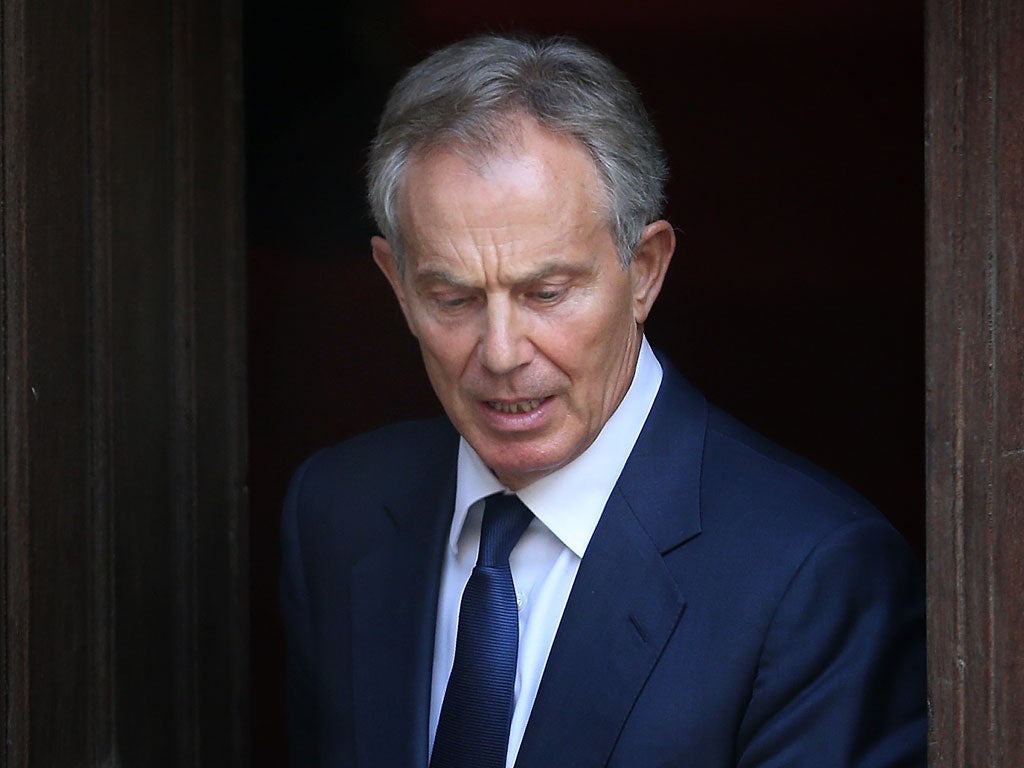Help me decide future of press, Leveson asks Blair
Former Prime Minister defiant on relationship with the media under interrogation at inquiry

Your support helps us to tell the story
From reproductive rights to climate change to Big Tech, The Independent is on the ground when the story is developing. Whether it's investigating the financials of Elon Musk's pro-Trump PAC or producing our latest documentary, 'The A Word', which shines a light on the American women fighting for reproductive rights, we know how important it is to parse out the facts from the messaging.
At such a critical moment in US history, we need reporters on the ground. Your donation allows us to keep sending journalists to speak to both sides of the story.
The Independent is trusted by Americans across the entire political spectrum. And unlike many other quality news outlets, we choose not to lock Americans out of our reporting and analysis with paywalls. We believe quality journalism should be available to everyone, paid for by those who can afford it.
Your support makes all the difference.Tony Blair has been invited to draw up proposals on how to regulate the press in future. In an unusual end to more than four hours of testimony, Lord Justice Leveson asked the former Prime Minister to join a select group of witnesses who will help guide his thinking in writing his final report.
The request will dismay those who believe Mr Blair is still too close to the Murdoch empire, as well as newspaper groups who feel he harbours grudges over the treatment he received while in office.
Mr Blair claimed:
* He had an entirely professional "working" relationship with Rupert Murdoch and said there was "nothing odd" about him ringing the Australian proprietor three times immediately before the Iraq war to brief him on the invasion. He said his relationship with Mr Murdoch only changed after he left Downing Street and "I got to know him". He denied he had become godfather to one of Mr Murdoch's children, Grace, "on the basis of my relationship in office".
* Mr Murdoch did not lobby him directly over media policy when he was Prime Minister.
* The anti-European views of Mr Murdoch and News International did not affect government policy. "Europe was the major thing that he and I used to row about," he said. "I believed in what I was doing, I didn't need him or anyone else to tell me what to do."
* His director of media, Alastair Campbell, and ally Peter Mandelson did not bully journalists – a suggestion greeted with laughter in Fleet Street.
Mr Blair said he had sent Rebekah Brooks a message of support immediately after she resigned as chief executive of News International in the wake of the Milly Dowler phone-hacking revelations because, "I'm somebody who doesn't believe in being a fair-weather friend and certainly I said I was very sorry for what happened to her."
Mr Blair also revealed that his wife, Cherie, had either taken or considered legal action over more than 30 media reports in five years. He said some journalists had waged a "personal vendetta" against his wife which had gone "too far".
But it was the request by Lord Justice Leveson to Mr Blair to submit his ideas for how a regulatory regime of the future might look which will concern parts of the media.
In doing so, the judge gave his clearest indication yet as to the areas his final report will address as well as repeating his insistence that he had "absolutely no interest in imperilling freedom of expression or the freedom of the press".
"As a lawyer and a judge I am very used to looking backwards and deciding what has happened but it's not necessarily a given that a judge is the best person to make recommendations for the future," he said. "I recognise immediately that [this] is the task that was given to me last July by the Prime Minister. But because these are issues that you've thought about, if you can give me your view, I would be very grateful."
Lord Justice Leveson said he believed it was possible to construct a statutory – but independent – complaints body that could command the respect both of the press and the public.
"Whatever comes out of this must be independent of government, independent of the state, independent of Parliament, but independent of the press," he said. "It must command the respect of the press but be independent from it."
He added that any system which replaces the PCC should be able to provide financial redress to those who could not afford to litigate – with serious financial sanctions.
"I recognise the parlous financial position of much of the press. But it's important that sanctions are taken seriously," he added.
Join our commenting forum
Join thought-provoking conversations, follow other Independent readers and see their replies
Comments